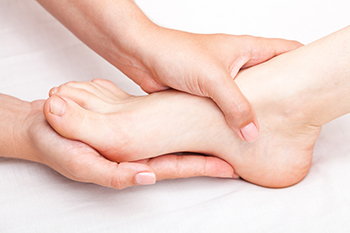
Research has shown the feet can indicate serious health issues within the body. The condition known as scleroderma may be evident in the feet. The symptoms can consist of cold feet and toes and can be associated with Raynaud’s phenomenon. Additional signs of scleroderma may include having patches of thickened skin that develop on the feet. The affected skin may be dry or itchy and will often require expert medical care. A chilblain may occur with Raynaud's disease and the skin may turn red, swollen, and become tender when touched. Having poor blood circulation and exposure to cold weather may lead to this condition, and it can affect the toes. There are simple methods that can be implemented to properly care for the feet. These can consist of choosing shoes that fit correctly and moisturizing the feet often. Many people who are affected by systemic sclerosis can experience a feeling of walking on small pebbles and this may be relieved by wearing custom-made orthotics. If you have any of these symptoms and would like to know more about systemic diseases of the feet, please confer with a podiatrist.
When dealing with systemic disease of the feet, it is extremely important to check the affected areas routinely so that any additional problems are caught quickly. If you have any concerns about your feet and ankles contact Ankita Patel, DPM from All Pro Foot and Ankle. Our doctor will assist you with all of your podiatric needs.
Systemic Diseases of the Feet
Systemic diseases affect the whole body, and symptoms usually are displayed in the feet. This condition can make a patient’s ability to walk unbearable. Systemic diseases include gout, diabetes mellitus, neurological disorders, and arthritis.
Gout – is caused by an excess of uric acid in the body. Common symptoms include pain, inflammation, and redness at the metatarsal/phalangeal joint of the base big toe. Gout can be treated by NSAIDs to relieve pain and inflammation, and other drugs that lower the acid levels in the body.
Diabetes mellitus – is an increase in the level of blood sugar that the body cannot counteract with its own insulin. Failure to produce enough insulin is a factor in Diabetes.
Diabetes of the Feet
Diabetic Neuropathy – may lead to damaged nerves and affect the feet through numbness and loss of sensation.
Peripheral Vascular Disease – can restrict the blood flow to the feet, and often times lead to amputation of the feet.
If you have any questions please contact our office located in Swedesboro, NJ . We offer the newest diagnostic and treatment technologies for all your foot and ankle needs.

